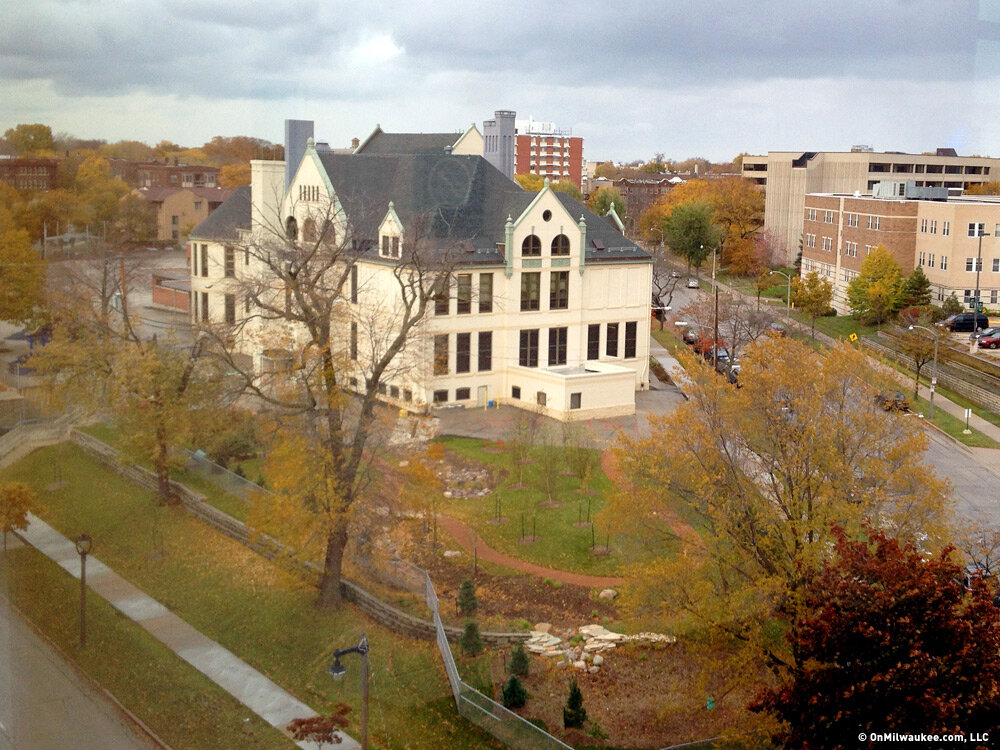Earlier this week, three days before Milwaukee Public Schools students were set to return to start the 2011-12 school year, I paid a visit to Roosevelt Middle School of the Arts to meet with the school's Mike Saindon to see how a music teacher prepares to make sure the new school year starts off in tune.
The hallways were mostly dark but the school was already humming with activity. Downstairs, hallway floors were being cleaned. In a number of rooms staff was arranging desks and prepping rooms. Upstairs a City Year team member was talking with some folks.
I knew I was in the right place when I walked into a big, bright room to find Saindon – one of three music teachers at the school – testing out a new electric bass guitar.
Saindon is an MPS veteran who is in his fifth year at Roosevelt. Previously, he taught for two years at Samuel Morse, seven years at John Muir and seven years at a number of schools, including Maryland Avenue and Riley.
While some of Saindon's summer set-up work will ring familiar with teachers of any subject, other tasks are decidedly different.
At the end of each school year, the school's instruments are sent out for maintenance and repairs. So, first thing back, Saindon checks in the saxophones, flutes, trumpets and other instruments, some of which belong to Roosevelt. Other instruments in his care are actually loaned to the school by MPS' central office.
"All told, there are more than 100 instruments," said Saindon. "The ones that I know needed work, I open them up to see that they're OK. Roosevelt is a pretty old school and there are some pretty old instruments here."
Saindon also does quite a bit of minor instrument repair and maintenance during the course of the school year. He sends out instruments that need major repairs, but unsticks trumpet valves and restrings instruments, for example, on the fly.
"I try and do the instrument stuff right then and there," Saindon said.
"Flutes are particularly bad because kids all think that because they're made out of metal they're indestructible. I'm forever adjusting those. I have my little tool kit that I keep handy. Especially with the beginners it's like being a mechanic."
The instruments, in their cases, were lined up on some tables that Saindon has used to separate the student area from a no-go zone in the spacious room that also contains a few smaller storage and practice rooms.
Room set-up also requires attention. Each year, Saindon sees how the seating and furniture arrangements are working out and orchestrates a tinkered floor plan.
This year, for example, he flipped the chairs around so that he can keep the room's two doors in his view to prevent distractions from the hall from seeping into his class.
"This rooms presents a lot of issues because it's so big. And it's not square," he said, pointing to a blind corner with a door. "I've got to think about the room arrangement. Some things work well, some things don't."
Like that blind corner. The door, which leads to the orchestra room, doesn't lock, so kids will sometimes try to slip through. Hence, the tables that sequestering that part of the room.
Then, Saindon has to choose the music that he will teach each year. For the most part, the pieces change to accommodate student abilities.
"Some pieces stay the same," said Saindon. "Like if we do a Halloween parade, we'll always do this, this, this and this. Because the kids can memorize it and they can start memorizing it their seventh grade year so when they're eighth graders hopefully they don't have to worry to much about it. Because I do not like using music on marching. So we can focus on staying in place and staying in time."
But, again, Saindon has to take into account the kids arriving at the school.
"This year the kids are not quite as advanced, because there's not that many schools that start kids in band early and they don't come to me having skills yet, so I've got to take that into consideration and do music that's at an easier level.
"Some of the orchestra kids have been playing since they were 3 or 4 years old. By sixth grade they may have been playing music more than half their lives. I don't know if I have anybody coming to me as a sixth grader that's already playing."
Then he has to copy that music so that the 34 to 36 kids in each of his seventh and eighth grade classes will have copies for their folders. The sixth graders will learn from a book. When I visited he had two songs copied and had about six or eight more to for.
"I've got the folders all done," he said. "If I get time I'll get the music actually into the folder. Or it'll be like day two, 'Here's your folders,' and I'll pass out the music. But I've got a pretty good start."
Perhaps surprisingly, just three days before the start of a new school year, Saindon still faced a number of unanswered questions, including who is in his class, what his day will look like and even exactly how he'll teach his classes.
"I don't have my actual schedule yet," he said. "I don't know when the classes are, I don't know when my lunch is, I don't when my prep time is."
Saindon gets one prep period and a lunch break each day.
He expected to have the class list by the following day and was looking ahead to a Sept. 7 MPS music department meeting to find out more about what this school year will look like in his and the other music rooms in the district.
"This may be a different year. In the past I've had traveling teachers that come in and work with groups of students. I've had a drum teacher," he said. "Most of them are musicians in the community. My woodwinds teacher was Suzanne Grzanna. I've had good people."
If those specialized teachers aren't coming back this year, Saindon will need to figure out how to teach 36 kids to play a number of different instruments at the same time.
"I haven't heard anything either way," he said. "Hopefully we'll hear during that meeting what the year will shake out; whether there will be any traveling teachers or not. (If not) I'll have to have group days where I work with one group of students and I will have to have something that will keep everyone else reasonably on task.
"There will be a lot of, 'OK, here's your book. Your book has a CD, your book has a DVD. Work on this at home and when we come back we rehearse what you've practiced at home.' I tell them, this is not music practice, this is rehearsal. Rehearsal means that you've practiced at home and now we're going to do it together. That's a hard difference to get in their heads."
He can also suggest kids take private lessons or attend MPS' Saturday Music Academies, which focus on small group instruction. But he's concerned for the future of those, too.
"Supposedly those are still happening," Saindon said. "I'd like to see that program grow. I've had a lot of success already in the one year that I've done it. They haven't said this has been cut yet."
Born in Brooklyn, N.Y., where he lived until he was 17, Bobby received his BA-Mass Communications from UWM in 1989 and has lived in Walker's Point, Bay View, Enderis Park, South Milwaukee and on the East Side.
He has published three non-fiction books in Italy – including one about an event in Milwaukee history, which was published in the U.S. in autumn 2010. Four more books, all about Milwaukee, have been published by The History Press.
With his most recent band, The Yell Leaders, Bobby released four LPs and had a songs featured in episodes of TV's "Party of Five" and "Dawson's Creek," and films in Japan, South America and the U.S. The Yell Leaders were named the best unsigned band in their region by VH-1 as part of its Rock Across America 1998 Tour. Most recently, the band contributed tracks to a UK vinyl/CD tribute to the Redskins and collaborated on a track with Italian novelist Enrico Remmert.
He's produced three installments of the "OMCD" series of local music compilations for OnMilwaukee.com and in 2007 produced a CD of Italian music and poetry.
In 2005, he was awarded the City of Asti's (Italy) Journalism Prize for his work focusing on that area. He has also won awards from the Milwaukee Press Club.
He has be heard on 88Nine Radio Milwaukee talking about his "Urban Spelunking" series of stories, in that station's most popular podcast.







